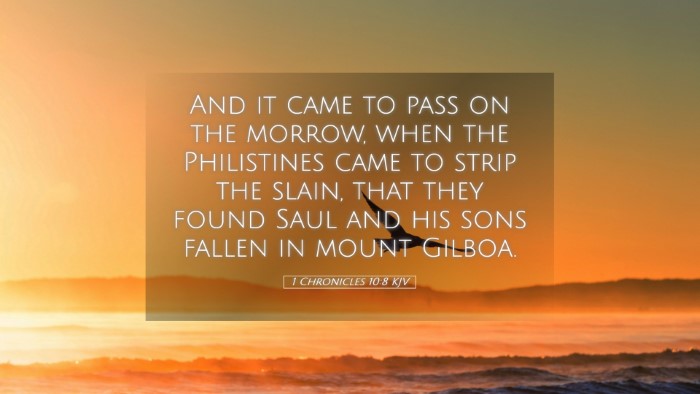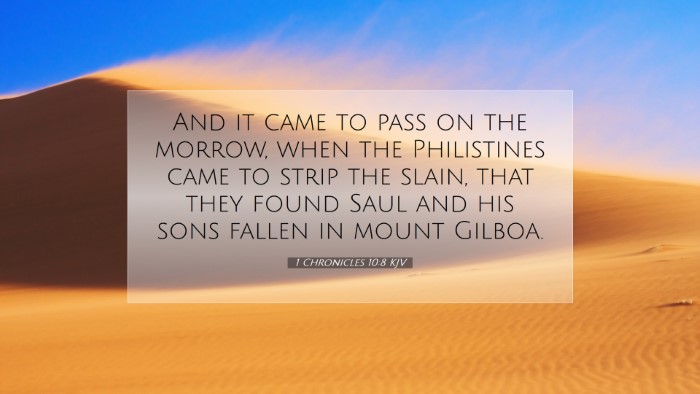Commentary on 1 Chronicles 10:8
Verse Reference: 1 Chronicles 10:8
“And it came to pass on the morrow, when the Philistines came to strip the slain, that they found Saul and his sons fallen in mount Gilboa.”
Introduction
The account of Saul's death, particularly in 1 Chronicles 10, presents a critical narrative that marks the end of the first king of Israel. The verse captures a solemn moment in the history of Israel, illustrating the defeat faced by Saul and his sons. This commentary will explore various angles, providing insights into Saul's life, his relationships, and the theological implications of his demise.
Context and Historical Background
Understanding the context of this passage is essential. Saul’s kingship, characterized by early promise but ultimately overshadowed by failure, serves as a precursor to David's rise. This verse falls within a larger narrative of the conflict between Israel and the Philistines, and it prompts a reflection on the divine judgment present in Saul's life.
Matthew Henry's Perspective
Take from Matthew Henry's commentary on this verse, we observe a profound lesson on the consequences of disobedience to God:
- Divine Judgment: Henry emphasizes that Saul's downfall was not merely a result of military defeat, but a manifestation of God's judgment against his continual impenitence and disobedience.
- Morality of Leadership: Leadership, as depicted in Saul’s narrative, conveys profound moral implications. A leader's failure has repercussions that extend beyond their immediate sphere.
Albert Barnes’ Analysis
Albert Barnes offers a thorough examination of the events following the battle at Mount Gilboa:
- Unveiling the Philistines' Practices: Barnes describes the Philistines' actions as typical of their warfare—seeking to desecrate the bodies of the fallen in a demonstration of victory.
- Saul's Fall: He notes how Saul’s death is depicted with a sense of finality and tragedy, highlighting the grave consequences of forsaken paths and alliances, particularly God’s disfavor.
Adam Clarke's Insight
Adam Clarke’s exposition adds depth to the psychological and faithful ramifications of Saul’s death:
- Saul's Legacy: Clarke discusses how Saul’s legacy is intertwined with the themes of regret and the tragic potential of human frailty.
- Faithlessness and Consequences: He points to the spiritual decay that can result from faithlessness, as the narrative of Saul serves as a cautionary tale that resonates through generations.
Theological Reflections
As we contemplate the implications of Saul's death, several theological reflections arise:
- The Nature of Sin and Its Results: Saul's demise underscores the ramifications of sin. His initial willingness to serve God gave way to disobedience, highlighting the danger of gradual spiritual decline.
- God’s Sovereignty in Leadership: The transition from Saul to David illustrates God’s sovereign choice in leadership—He raises up leaders as a reflection of His purposes.
- The Importance of Humility: Saul’s pride and inability to heed prophetic counsel led to his fall, reminding us of the necessity of humility and submission to divine authority.
Practical Applications for Today
For pastors, theologians, and earnest students of the Word, the lessons from Saul's narrative resonate consistently:
- Leadership and Accountability: Those in positions of leadership are continually reminded of their accountability before God. The weight of this responsibility requires fervent prayer and adherence to God's word.
- Warning Against Complacency: Believers are cautioned against complacency in their spiritual journey. A life reflective of God's word is essential to avoid the pitfalls that Saul encountered.
- Grace and Redemption: While Saul's story closes with tragedy, it opens up the discussion about the grace that is available through Christ. Even in failure, God’s redemptive plan is always at work.
Conclusion
1 Chronicles 10:8 serves as a pivotal moment in biblical history, a reminder of the frailty of human leadership severed from God’s guidance. The insights from respected commentators help us grasp not only the historical context of Saul’s life but also the rich theological significance and moral lessons that continue to pose vital reflections for believers today. As we study, let us strive to learn from Saul's mistakes and seek deeper understanding and faithful living in our own journeys.


